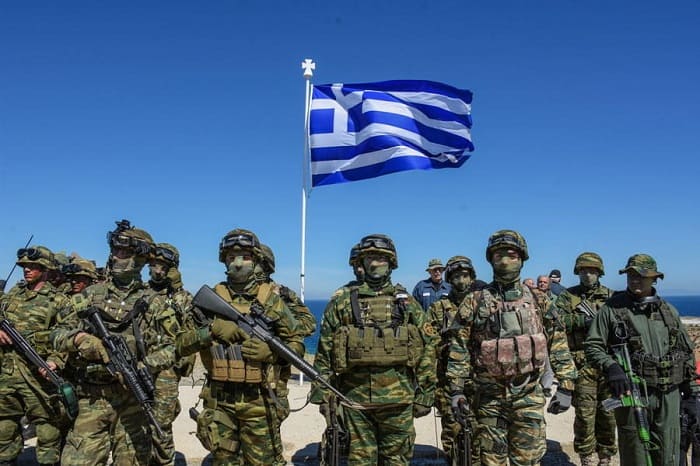
Greece has announced a significant escalation in its defense spending, unveiling a comprehensive 12-year plan that will allocate 25 billion euros, approximately $27 billion, to modernize and transform its armed forces. Prime Minister Kyriakos Mitsotakis revealed the ambitious strategy in a parliamentary address on Wednesday, emphasizing the critical need for robust national security in an increasingly volatile global landscape.
“Price of Freedom” Underpins Massive Investment
Prime Minister Mitsotakis addressed lawmakers and emphasized that the multi-billion euro defense allocation is a strategic investment in Greece’s sovereignty and national dignity. He invoked the timeless principle of national defense, stating, “The price of freedom is eternal vigilance.”
Mitsotakis framed the defense investment as integral to Greece’s overall national development, asserting that security is not merely a prerequisite for stability but also an essential foundation for broader national progress. “There can be no progress without security,” he declared.
Fiscal Prudence Remains a Priority
Despite the significant financial outlay, Mitsotakis reassured the nation that fiscal responsibility would remain paramount. He stressed that the necessary “fiscal flexibility” to fund the defense plan would not translate into unchecked spending or financial mismanagement. “Not only because the markets are closely monitoring and assessing us, but also because the overall performance of the economy is a vital factor for security and stability,” he explained. This acknowledgment of economic considerations indicates a balanced approach, seeking to bolster defense capabilities without jeopardizing the nation’s financial health.
Elevated Defense Spending in NATO Context
Greece’s commitment to defense spending is already notable within the North Atlantic Treaty Organization (NATO). Alongside Poland, Estonia, and Latvia, Greece stands out as one of the few member states that consistently allocates more than 3 percent of its Gross Domestic Product (GDP) to defense, surpassing the alliance’s 2 percent guideline. This year, Greece has demonstrably reinforced its defense commitment by doubling its military budget to 6.13 billion euros ($6.6 billion) for 2024, further solidifying its position as a significant defense spender within the alliance. With a population of approximately 10.5 million, this level of expenditure reflects a substantial per capita investment in national security.
Domestic Industry at the Forefront of Procurements
A defining characteristic of Greece’s new defense strategy is an emphasis on domestic defense industries. Mitsotakis stated that all future defense procurement contracts will mandate “significant Greek industrial involvement.” This requirement extends beyond assembly, demanding meaningful participation through component manufacturing and the integration of Greek personnel into defense projects. This policy aims to foster self-reliance and stimulate economic growth within Greece’s defense sector.
Existing national defense enterprises are slated to play a central role in realizing this industrial objective. Companies such as Hellenic Aerospace Industry (EAB), Greek shipyards, and Hellenic Defense Systems (EAS) are expected to be beneficiaries of this initiative, leveraging their established co-production capabilities and expertise. The plan envisions domestic firms contributing to the production of naval vessels, submarines, armored vehicles, and munitions, reducing reliance on foreign suppliers and fostering indigenous technological development.
Modernization Priorities: Naval, Air Defense, and Advanced Technologies
While specific procurement details are forthcoming, the training material offers insights into key areas of focus for Greece’s defense modernization efforts. Naval capabilities appear to be a high priority, exemplified by a recent proposal from French shipbuilder Naval Group. The proposal aims to deepen French-Greek cooperation in maritime defense and technology, specifically suggesting the local construction of three additional Kimon-class (FDI HN) frigates within Greece. This would augment the four frigates already slated for acquisition, with the finalization of the fourth expected imminently.
Furthermore, Greece is strategically targeting advancements in cutting-edge defense technologies. This includes a concerted effort to expand its capabilities in artificial intelligence, unmanned aerial vehicles (UAVs), and electronic warfare systems. The Hellenic Defense Innovation Center (ELKAK) is positioned to be a crucial hub for fostering innovation and development in these critical technological domains.
Strengthening air and missile defense systems is another identified priority. Athens is reportedly engaged in negotiations with Israel to acquire an advanced anti-missile shield, which would also incorporate enhanced anti-drone capabilities, addressing evolving aerial threats. In addition to Israel, France, Italy, and Norway have been identified as potential suppliers for a range of new weaponry, including unmanned vessels, drones, and advanced radar systems.
Strategic Shift Towards Self-Reliance
Greece’s newly announced 12-year, $27 billion defense plan represents a watershed moment in the nation’s defense posture. Beyond the sheer scale of the financial commitment, the strategy signals a decisive shift towards greater self-reliance, prioritizing domestic industrial involvement and technological advancement. By focusing on modernizing its armed forces across naval, air defense, and advanced technology domains, Greece is positioning itself to meet the evolving security challenges of the 21st century while simultaneously stimulating its national economy and reinforcing its sovereign capabilities. The coming years will be crucial in observing the implementation and impact of this ambitious and transformative defense strategy.
